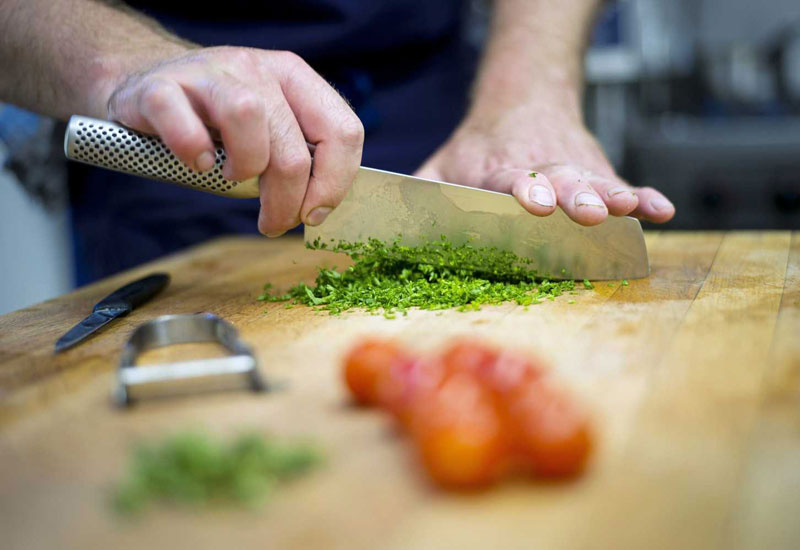Local produce
Indeed, sourcing locally remains to be a subject close to chefs’ hearts, although the amount of produce respondents are able to procure locally has not changed since last year. Last year, 23% of chefs said they get 20–30% of their ingredients locally and this year that figure was almost exactly the same, with 22.7% stating that 20-30% of what they source is procured locally.
Caterer spoke to one chef, however, who is managing to go further than this with his outlet and at home. The Croft head chef Darren Velvick says: “At The Croft we try to buy 80% of our produce locally and organic, using the local farmers. As a family, I always buy from the farmers’ market every Friday. I love the fact we are putting the money into the farmers’ pockets and not the big supermarkets.”

| Advertisement |
He adds that owing to this approach, The Croft builds its menu around what is available in the region at the time, which helps to keep its prices down.
Unsurprisingly, the quality of ingredients was said by respondents to be the most important factor in the success of their operation. Quality was listed as the top priority by 68.2% of chefs surveyed and when asked what their most important focus was in their role, many chefs replied: “quality of the food and ingredients” and “ensuring consistent quality of produce”.
For this reason, buying locally is not always possible, and even Velvick concedes that while he sources local organic chicken, vegetables and some fish for his outlet, he does have to import beef, lamb and European dish “at a greater cost”.
Obtaining “good quality food at affordable prices” was also stated by several chefs to be key. The price of quality ingredients is never far from chefs’ minds and the cost of importing the products that they need was revealed as the fourth biggest issue affecting their’ outlets, in their opinion, with 36.4% of chefs saying this is their biggest concern.
One chef anonymously reported that “sustaining the high quality of food while remaining profitable as an organisations is the biggest challenge”.
Culinary hub
Once again for this year’s survey, we asked chefs if the Middle East has attained the status of an international culinary hub.
Last year, 73.3% told us that it had, which was about 10% more the previous year. This year, however, slightly fewer respondents believed this to be true, with 68.2% confirming that, in their opinion, the region is a culinary hub.
Among chefs who answered ‘no’ to this question, reasons such as “good produce is hard to get and very pricey, which affects consistency, seasonality and innovation” and too many restaurants looking like “clones” were cited.
Another respondent said: “To be a culinary hub, you need amazing food at all levels from street hawkers to fine dining. The cost of a start-up is too high to have ‘real’ street food and the red tape in most areas does not support this concept. I do think things are headed in the right direction though.”
These views are held by the minority though, and those who agreed with the majority of respondents that the region is a culinary hub praised the high calibre of professionals that the Middle East has attracted. They also praised its fast growth, not only in the variety of cuisines present here, but the number of high-end restaurants.
Okku Dubai head chef Leonard Tanyag tells Caterer he thinks Dubai in particular has become the culinary hub, and serves as a gateway to the East for the West.
“People from all over the world call Dubai their home so they expect to eat and drink what they would back home,” he remarks.
He feels this situation has created a market offering everything, from fine dining restaurants serving Japanese food to casual outlets serving American fare, to South East Indian curry houses — all of which means Dubai, at least, has become a culinary hub. The vast majority of participants in the survey also felt the region, on the whole, will be widely perceived as a culinary hub within the next five years. Once certain conditions are met, 84.1% of chefs agreed that this is achievable.









 Search our database of more than 2,700 industry companies
Search our database of more than 2,700 industry companies









